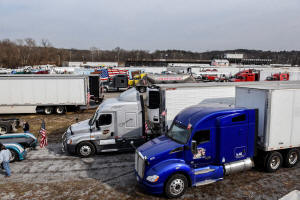Trucks, RVs and cars flock to Washington area to protest COVID
restrictions
 Send a link to a friend
Send a link to a friend
 [March 07, 2022]
By Ted Hesson [March 07, 2022]
By Ted Hesson
WASHINGTON (Reuters) - More than a thousand
large trucks, recreational vehicles and cars are gathering on the
outskirts of Washington as part of a protest against COVID-19
restrictions that threatens to roll on the U.S. capital in the coming
days.
The so-called "People's Convoy," which originated in California and has
drawn participants from around the country, is calling for an end to all
pandemic-related restrictions. It was inspired by demonstrations last
month that paralyzed Ottawa, Canada's capital city.
The convoy's message has been undercut in recent weeks as major U.S.
cities have rolled back mask mandates and other measures against
COVID-19, which has led to more than 950,000 deaths in the United States
but has been mitigated with vaccines and therapeutics. President Joe
Biden, a Democrat, signaled in his State of the Union speech on Tuesday
that the country was entering a new, more controlled phase of the
pandemic without business lockdowns or school closures.
Still, more than 100 18-wheeler trucks amassed with other vehicles on
Friday evening at the Hagerstown Speedway, a racetrack about 80 miles
(129 km) from downtown Washington, according to Reuters witnesses.
Drivers continued to stream into the parking lot on Saturday morning,
one witness said.

A website for the protest said they did not plan to enter "D.C. proper"
and social media posts suggested they could remain at the racetrack on
Saturday. But one participant who described himself as the lead trucker
told a cheering crowd at the racetrack on Friday night that he would
drive his truck into the heart of the American capital.
"D.C., the government, whomever, can claim that they have all this
opposition for us waiting in D.C.," the man said. "But that flag on the
back of my truck will go down to Constitution Avenue between the White
House and the Washington Monument."
A little more than a year ago, supporters of former Republican President
Donald Trump stormed the U.S. Capitol in an attack that left five people
dead and more than 100 police officers injured.
[to top of second column]
|

Vehicles are parked as part of a rally at Hagerstown Speedway, after
some of them arrived as part of a convoy that traveled across the
country to protest coronavirus disease (COVID-19) related mandates
and other issues, in Hagerstown, Maryland, U.S., March 5, 2022.
REUTERS/Stephanie Keith
 U.S. federal law enforcement
agencies have been coordinating with state and local authorities for
weeks in preparation for the possible arrival of the convoy, said
one U.S. official who requested anonymity to discuss internal
operations.
A Feb. 26 U.S. Department of Homeland Security (DHS) bulletin to law
enforcement reviewed by Reuters said trucker convoys could hinder
emergency responders depending on the size of the protest.
The bulletin said federal law enforcement was not aware of any
substantiated threats from domestic violent extremists, but that
some extremists "probably will be drawn to the event and could
engage in premeditated or opportunistic violence."
DHS said the possibility of an attack could be higher because COVID
restrictions have been a "key driver" of domestic extremist violence
over the last two years. Federal officials would be unlikely to see
violent plotting in online public platforms beforehand due to the
use of encrypted apps and private forums, it said.
Federal law enforcement is also cognizant of the need to respect the
right to peaceful protest, the official said.
On Friday evening, a woman from nearby Silver Spring, Maryland, who
identified herself only as "Dorothy" said she opposed COVID-related
restrictions and that the issue had caused divisions in her family
and problems at work.
"I think our medical choices are private and we should not be
required to disclose them to participate in everyday activities,"
she told Reuters.
(Reporting by Ted Hesson in Washington, and Leah Millis, Julio-Cesar
Chavez and Stephanie Keith in Hagerstown, Maryland; Editing by
Daniel Wallis)
[© 2022 Thomson Reuters. All rights
reserved.] This material may not be published,
broadcast, rewritten or redistributed.
Thompson Reuters is solely responsible for this content.
 |